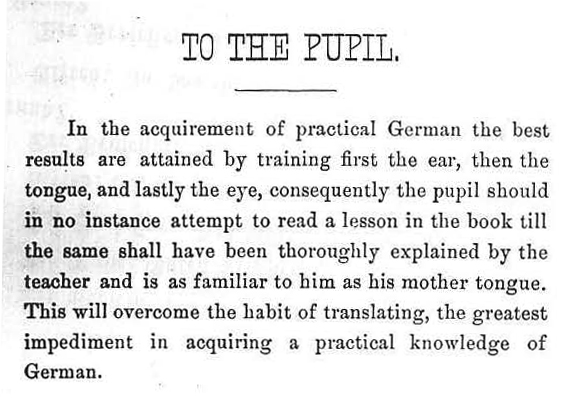| A blast from the past: Leslie S. Dodge's German Book and his "natural method" |
last modified: |
A common experience in our profession: "Here, professor, I thought you'd like to see this old German textbook we had around our house. You can keep it if you want."
And that, as I recall, is how I came into possession of the book [title to come later]: Ein Lese- und Lehrbuch nach der natürlichen Methode, by a certain Leslie S. Dodge. Sixth edition, 1897, published in Syracuse, NY, by the author, address 326 Delaware Str.
I was astounded. The author's introduction must have been a blast of fresh air in 1897, and it produces a strong breeze even now. The smaller print in the subtitle, "A reader and textbook" is only half-true - it's much more / other than a reader, and it is certainly not (and was not then) a conventional textbook. But the part about "Natural Method" (note the larger print) is legitimate - if not absolutely accurate, then still a more deserving claim than could be made by most other textbooks of the time, by those of the decades after 1897, and even by most of those of our own time.
Let's look at the preface (click on images to show them full-size):
 |
 |
Dodge's notion of proficiency is fairly consonant with ACTFL notions - practical facility. He champions heavy L2 input, with the learner actively developing structural principles from organized examples. He deals with grammar skillfully - and note how he understands that speakaers of L1 have extensive grammatical competence already in childhood; we would describe that knowledge in terms of being able to detect well-formed utterances, which does not require them to have at their command the grammatical terminology (which, let's admit, many learners in grammar-focused programs learn but then totally misunderstand).
Of course Dodge quite overestimates what can be learned in those five weeks, even if his learners were doing more homework than ours generally do. The level he envisions is more like Intermediate-High in speaking (and possibly reading), maybe a little higher in listening, and - far too optimistic - Asdvanced-High in reading. But his overestimation of attainable proficiency is far less outrageous than what is implied by the content of the ordinary introductory textbok, both then and even now, which generally extends well into the ACTFL Superior level, a proficiency that is not observed in actual assessments until learners have had many years exposure to the language, including long stays in-country.
Dodge's "scope and sequence" are refreshingly modern in the basic approach, though of course aimed too high, and with no explicit mention of function. The first five of the 25 lessons emphasize survival-level vocabulary (beverages, weather, parts of the body, time). Use of those words, along with simple structures, is conveyed by model dialogs between teacher and learners. Some are rather inane, but Dodge delivers the language, including the survival-level grammar, clearly. Further lessons get into transportation, health, social interaction, cultural monuments.
It is easy to criticize various features of Dodge's textbook. Of course the target level of proficiency is still too high. But we should also note the absence of one major feature of almost all (non-progessive) textbooks: there are no, repeat no, elaborate explanations of grammar set off in separate sections and, along with mechanical exercise, made the focus of the learning. Occasionally a simple explanation, in German, in included in a dialog. There are also no, repeat no, separate, length vocabulary lists, with their format indicating that the words and their English equivalents are to be memorized. Dodge does include short lists, as one speaker mentions them to another, but English equivalents are not given; the dialogs explain them. The same principle of "i+1" and negotiating meaning is applied throughout. Dodge also includes lists of antonyms and synonyms and something like what we would call word-maps or word-clouds, often with synonyms that closely resemble English.
Dodge does not neglect fun. There are language-learning games (each speaker adding a new item to what has come before), poems, songs.
Perfect? Of course not. Progressive? Definitely. I would assert that a Dodge, working in our time, would produce a pretty good proficiency-oriented textbook.
